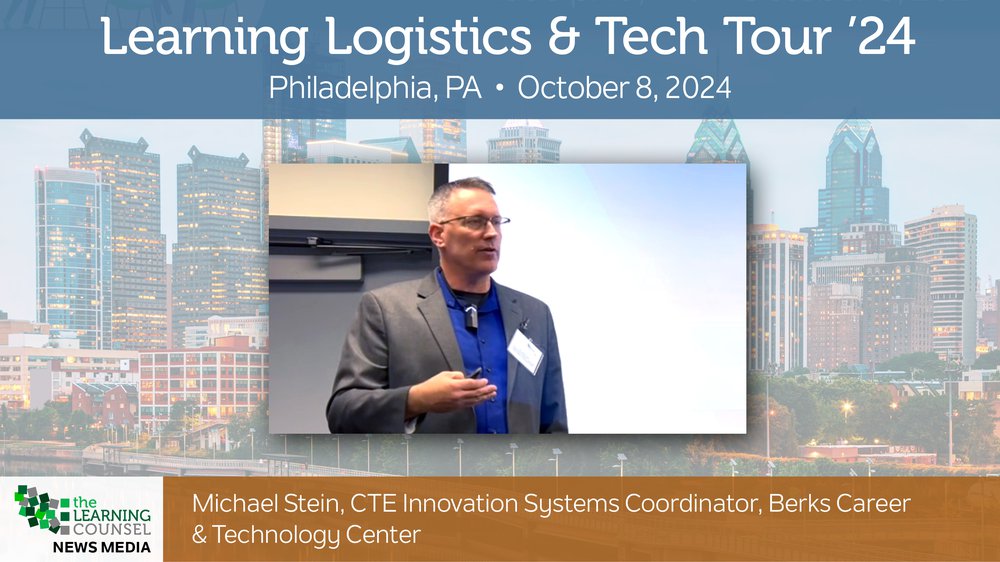At the Philadelphia Learning Logistics & Tech Tour, Michael Stein, the Career and Technical Education (CTE) Innovation Systems Coordinator at Berks Career & Technology Center (BCTC), shared his team’s journey in integrating artificial intelligence (AI) into their programs. Stein’s presentation shed light on how this evolving technology is reshaping both student learning and teacher efficiency in career and technical education (CTE).
Stein began by introducing the Berks Career & Technology Center, a unique CTE institution in Berks County, Pennsylvania, that serves students from 16 local school districts. At BCTC, students spend half of each school day immersed in specialized career programs, gaining hands-on experience across a range of trades and disciplines. This career-centered focus has prompted the center to explore innovative tools like AI to improve both the curriculum and the delivery of education.
“Our role as a career center means we have to continually adapt and prepare students for real-world jobs,” Stein explained. “AI is helping us shift many of the foundational aspects of how we conduct our work.” He emphasized that AI integration is not just about teaching students technical skills but also about enhancing educators’ ability to manage curriculum and develop more effective learning experiences.
For CTE instructors, many of whom come directly from industry with hands-on trade experience, adapting to classroom management, curriculum development, and technology integration can be challenging. As Stein noted, “Our instructors are subject matter experts, but they often need support in creating curriculum that aligns with educational standards.” AI is proving valuable here, helping teachers streamline lesson planning and focus more on student engagement and instruction.
By automating routine tasks, AI enables teachers to allocate more time to direct interactions with students. Stein highlighted that this shift is crucial, as BCTC instructors typically work with students who thrive in practical, experiential learning environments. The incorporation of AI helps bridge gaps between industry knowledge and educational practice, empowering instructors to teach more efficiently without being bogged down by administrative tasks.
Stein’s presentation underscored the potential of AI to empower students by exposing them to cutting-edge tools and fostering the skills they’ll need in a technology-driven workforce. In programs such as automotive technology, health sciences, and information technology, AI can simulate real-world scenarios, offering students a chance to practice and problem-solve in safe, controlled settings. The use of AI-based simulators and intelligent tutoring systems also provides customized support, adapting to each student’s learning pace and needs.
“This introduction to AI is really opening new pathways for our students,” Stein shared. “They’re getting firsthand experience with the technology that will be foundational in nearly every industry.” By integrating AI into CTE, BCTC aims to ensure that graduates not only meet industry standards but are also prepared to lead as technology continuously evolves.
Stein acknowledged that while AI offers exciting possibilities, adopting it within an educational setting presents challenges, particularly in training and resources. At BCTC, Stein’s role involves carefully evaluating AI tools, not only for their immediate impact but also for their alignment with educational goals. For example, they consider how each tool will benefit both students and teachers and whether it enhances learning outcomes and operational efficiency.
“We’re striving to create a sustainable system where AI supports—not replaces—human expertise,” he said. “It’s about finding that balance and implementing tools that genuinely add value to the educational experience.”
Michael Stein’s vision for BCTC highlights the potential of AI to transform vocational and technical education. By streamlining educators' workloads, enhancing curriculum development, and exposing students to cutting-edge tools, BCTC is working to stay ahead in an ever-evolving landscape. With AI’s potential to support student achievement and enable teachers to concentrate on core instructional duties, BCTC serves as a model for how career centers nationwide can prepare the next generation for a future where technology and trades converge.
As Stein concluded, “We’re building a system that will set up our students for success, giving them the skills and experiences that make them highly employable and adaptable in a world where technology is the norm.” The work being done at BCTC is a testament to the power of innovation in education, illustrating how AI can redefine learning environments and equip students with the tools they need for the future.











